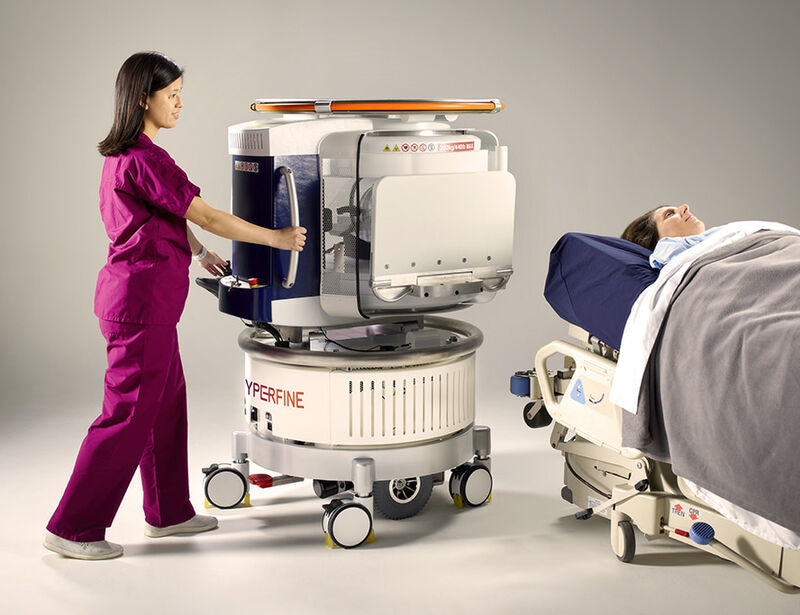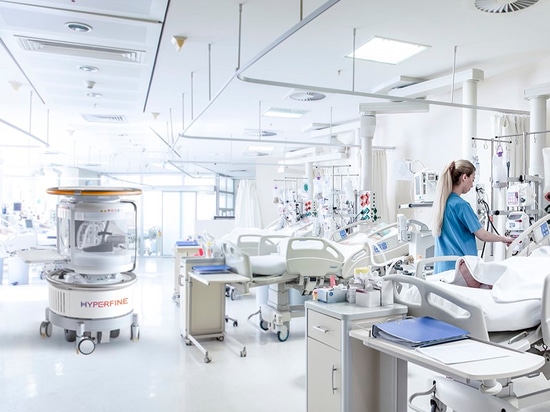
#Product Trends
Bedside MRI Machine Set to Transform Pediatric and Neonatal Care
A “game-changing” portable MRI machine is helping to transform pediatric and neonatal care by enabling detailed images of the brain to be collected at a child’s bedside. Swoop is developed by biotech company Hyperfine and is the first portable, point-of-care MRI device in Europe.
The machine can be brought to the patient’s bedside to collect detailed images of the brain. This takes away many of the usual constraints imposed by fixed, conventional MRI scanning, such as dedicated, bespoke rooms, complex power and cooling requirements, as well as extensive operator training. This has significant implications for clinical care as it means ill patients will not need to be moved from intensive or emergency care for an MRI scan, which is highly beneficial when treating babies and young children.
It is naturally applicable to neonatal, pediatric and adolescent imaging, where a family member can be present during a scan, within visual contact of the patient, the company said. There is also potential for use in lower resource environments or outside of hospital settings.
In June the scanner was delivered to King’s College London’s (KCL) Centre for Neuroimaging Sciences and the Newborn Imaging Centre at the Evelina London Children’s Hospital. David Edwards, professor of pediatrics and neonatal medicine at the university, said:
“The scanner has come to the neonatal intensive care unit because of our specialist facilities expertise. Our first work with Hyperfine will be to study brain problems in the newborn infant. We then aim to work with older children in pediatric intensive care, another area where portable MRI could be game-changing.”
Researchers from King’s College London Institute of Psychiatry, Psychology & Neuroscience (IoPPN) and the School of Biomedical Engineering & Imaging Sciences will work with Hyperfine to further develop and optimize the new MRI device for brain assessment in young people. This programme, led by King’s Health Partners and funded by the Bill & Melinda Gates Foundation, involves the assessment of brain health and potential treatments across 20 sites around the world including South Africa, Uganda, Pakistan, Malawi, India, Ethiopia, Ghana and Zambia.
As part of the collaboration, the team is partnering with PATH, a global non-profit organization dedicated to ending health inequity by development and scale up of innovative health solutions. PATH will facilitate the regulatory and import applications of the devices across several continents. Jo Hajnal, professor of imaging science at KCL, said:
“It has been amazing to experience receiving and setting up the MRI system. It is a truly modern product that came in a box, was driven under its own power to our clinical area and was set up in an afternoon. Although initially designed for adult brain imaging, there is clear potential for it to be developed into a powerful means to examine the brains of babies. This will be new, fresh and information rich. I am excited to be part of the research team that will make this possible.”
Professor Matthew Hotopf, director NIHR Maudsley Biomedical Research Centre, said:
“The Hyperfine system is a fabulous example of how collaboration between disciplines and across industry, academia and the NHS can bring about innovation, making MRI accessible in low and middle-income countries and impacting care across the world.”
As part of the global programme, the team will address specific challenges in ultra-low field neonatal MR imaging, creating high quality diagnostic data, motion insensitive images, silent scans and maps of brain maturation. They will also develop a range of protocols to help address birth complications, infection and malnutrition, which will be shared internationally.





